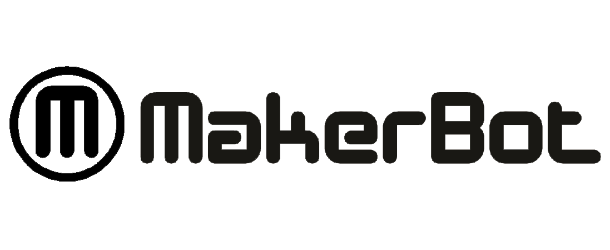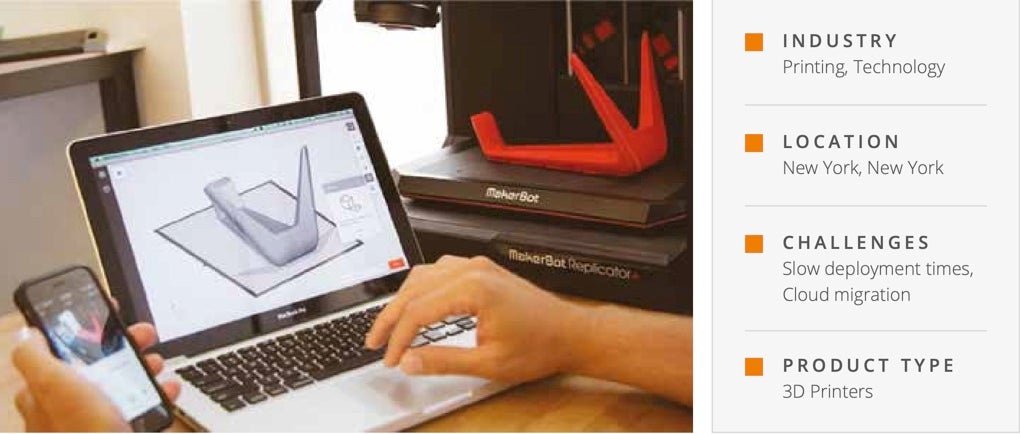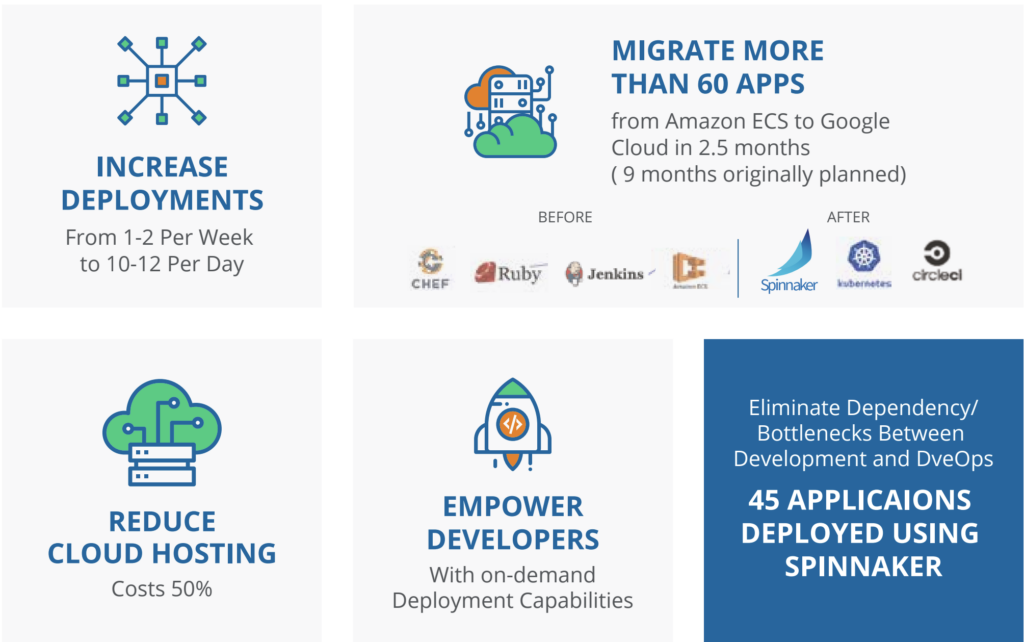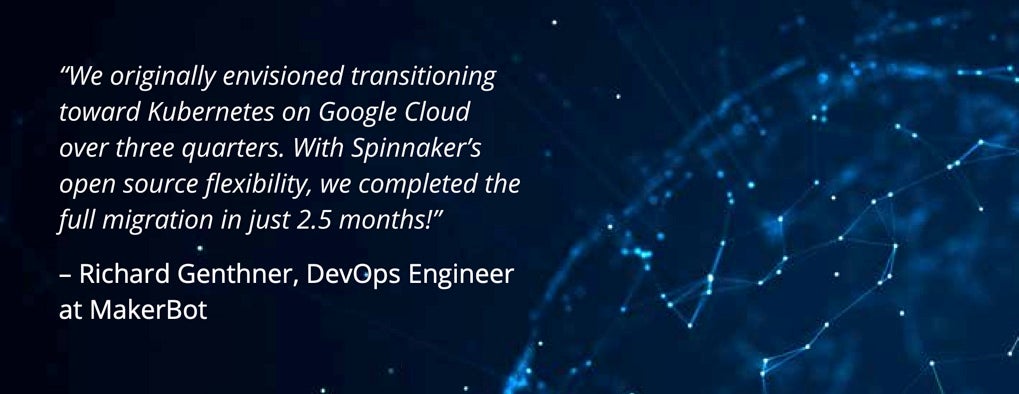Makerbot cuts costs by 50%: Moving to Kubernetes on Google Cloud using Spinnaker
By Richard Genthner, DevOps Engineer
at MakerBot
CHALLENGE
- Eliminating deployment bottlenecks
- Building a framework for on demand deployment
- Migrating from Amazon ECS to Google Cloud (GCP)
SOLUTION
- Established a continuous delivery pipeline to speed up deployments by providing developers with greater functionality
- Migrated in a smooth, gradual manner from Amazon ECS to Google Cloud
IMPACT
- Created a pipeline that completes as many as a dozen deployments per day
- Freed up time for engineers through simplified deployment workflow
- Significantly reduced dependency on DevOps
- Completed Google Cloud migration more than six months ahead of schedule

MakerBot is a leading manufacturer of 3D printers, making them one of the country’s most exciting and forward-facing hardware companies. The product experiences are currently changing classrooms, laboratories, hospitals, and manufacturing facilities around the world for the better, eliminating a variety of accessibility gaps and using technology to build a better world. It has a range of products covering not only the professional industry, but also education programs for universities and schools.

The Need for Change
MakerBot’s 3D printers provide industry-leading power, potential, and reliability, but, until recently, their software and application deployment practices were lagging behind. All deployments had to be manually reviewed, approved, and finalized by the DevOps team – a single person who juggled a variety of responsibilities.
That meant only one or two deployments per week were being completed, and even that level of productivity was entirely dependent on the schedule, workload, health, and attendance of an individual professional. An unexpected sick day or unavoidable scheduling conflict had the potential to significantly delay crucial updates to MakerBot’s wide variety of apps. At the same time, the development team was frustrated with their inability to improve the logjam through on-demand deployments.
An internal analysis also revealed that MakerBot needed to migrate from Amazon Elastic Container Service (ECS) to Google Cloud in order to leverage the full deployment and management power of Kubernetes and build a more responsive, modern system. With MakerBot’s existing framework in place, that migration was predicted to take more than nine months. Hoping to improve the quality, speed, and power of MakerBot’s deployment and delivery framework and ease the transition to Google cloud, Makerbot sought the power of Spinnaker’s open source, multicloud approach.
“I heard about Netflix’s success with Spinnaker through a close colleague and immediately recognized the technology’s potential to improve the way we were doing things at MakerBot. I knew that if I could get my developers the on-demand deployment capabilities they needed, we could drastically speed up our deployment times and be more responsive to user needs.”
– Richard Genthner, DevOps Engineer at MakerBot
Building a Better Approach with Spinnaker
MakerBot’s journey toward self-improvement required leveraging Spinnaker technology in two different ways. First, MakerBot would use Spinnaker as a medium to support their transition from Amazon ECS to Google Cloud. Additionally, however, Spinnaker’s capacity for release automation and self-service deployment could be integrated to empower the development team and reduce over-reliance on DevOps long-term.
Spinnaker’s compatibility with both Amazon ECS and Google Cloud enabled MakerBot to make a gradual, safe migration between the two clouds without any disruptions to service. Proof-of-concept was delivered in less than one week with the migration of a single app from ECS and Jenkins to Google and Spinnaker. From there, the development team was able to use Spinnaker to facilitate the full migration of their cloud-hosted apps and services at a pace that felt appropriate, while providing everybody with full functionality in the meantime.
Of course, part of that process was embracing the potential of the Spinnaker pipeline to give developers the power to make and implement changes on the fly in order to create the most responsive and results-oriented workflow. That move uncorked the bottleneck at DevOps, creating a much more agile development environment and supporting DevOps in focusing on the core of their job: infrastructure, coordination, communication, and quality assurance.
The Bottom Line
With a Spinnaker-powered solution in place, MakerBot was better able to leverage its human assets to maximize software delivery without sacrificing quality, reliability, or affordability. By using Spinnaker technology to rethink and redesign their approach to delivery and deployment, MakerBot was able to


The transition to the Spinnaker pipeline provided MakerBot with huge wins in both the shor and long-term. In the short-term, Spinnaker served as a powerful medium to facilitate the company’s transition toward a more powerful, affordable cloud service, reducing costs and creating a more flexible platform for development. The long-term benefits are even more powerful, however, as Spinnaker’s multicloud, continuous delivery framework has significantly streamlined development and deployment procedures, making it easier than ever to address issues as quickly and directly as possible to protect the health of the user experience and the business as a whole.
Thanks to Spinnaker, MakerBot now has a powerful, open-ended approach to software development and deployment that mirrors the quality and potential of their 3D printers. With their migration to the Google Cloud and Kubernetes, MakerBot is now positioned to grow their business at scale in an environment where adjustments, updates, and changes can be made faster and better than ever.
Learn More About the Power of Spinnaker
Spinnaker is an open-source, multi-cloud continuous delivery platform that helps you release software changes with high velocity and confidence. Spinnaker technology provides balance, validation, speed, and reliability for apps and micro-services of all shapes, sizes, and types.
If you’re looking to learn more about the potential Spinnaker has to transform your business’ approach to app or microservice deployment, be sure to explore www.spinnaker.io to connect with our rich knowledge base of how-to guides and success stories.
